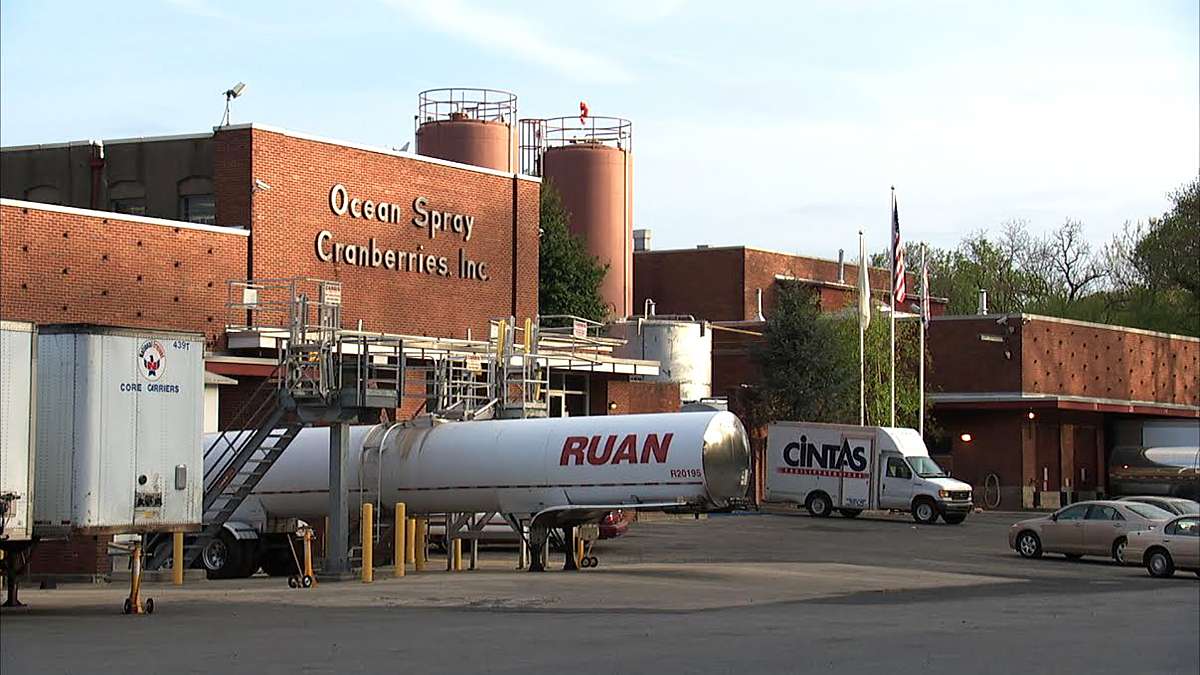Bordentown to hold its first cranberry festival since losing Ocean Spray
The downtown historic district in Bordentown City was a pleasant place to while away a recent weekday afternoon, with an assortment of shops and restaurants for visitors to choose from. At regular intervals, posters advertised the upcoming 25th Annual Cranberry Festival on October 4-5.
Nearby on Park Street, the business that inspired the Cranberry Festival and was inextricably linked to the downtown’s revival 25 years ago — the bottling plant for juice manufacturer Ocean Spray — sat mostly empty behind chain link fences.
The plant’s closing, first announced in 2011, is now largely completed, according to Ocean Spray spokeswoman Kellyanne Dignan. The only ones left at the plant are managing the shutdown. Dignan said about 100 Bordentown workers have or will eventually be relocated to the new plant in Upper Macungie, Pa.
Mayor Joseph Malone estimates that an additional 40 local residents lost their jobs in a series of phased layoffs that began in spring.
“Ocean Spray considered renovating our facility in Bordentown, N.J., but ultimately determined that the facility we need for our future could not have been duplicated at that site,” Dignan wrote in an e-mail. “Additionally, utilizing our existing partners in the Lehigh Valley area will help us to lower our distribution and freight costs.”
Ocean Spray is a grower-owned cooperative, according to Dignan. Despite the relocation, it will continue to have cranberry grower/owners in New Jersey, and continue to operate a receiving station in Chatsworth.
Meanwhile, merchants in the Bordentown City historic district were speculating on the long-term results of the closing.
Jackie Reed, coordinator of the Cranberry Festival, remembers when the downtown consisted largely of empty shops with a scattering of shot-and-a-beer bars. That was before local merchants and public officials led a revival with the help of professional consultants and state matching grants that refurbished sidewalks and storefronts.
When the project was completed in 1989, Reed said, the downtown wasn’t as thriving as it is today. But the organizers were pleased enough with the results that they wanted to draw people’s attention to them with a festival.
They chose cranberries as the theme, largely as a tribute to the Ocean Spray plant that had operated in the city since 1943, and its signature cranberry juice.
“Ocean Spray was a very good neighbor in Bordentown,” Reed said. “They’re really missed.”
That first cranberry festival drew about 4,000 attendees, Reed said. Recent ones have drawn about 45,000.
Thomas Moyer is president of the Downtown Bordentown Association, which sponsors the festival. He’s also the owner of a downtown store called Shoppe 202, purveyor of “uniques and antiques.”
He said downtown merchants have come to rely on the festival. The spike in sales during those two days typically produces enough money to fund his Christmas inventory, which in turn gets him through the slow winter months.
Despite the initial link to Ocean Spray, the festival appears to have picked up a momentum of its own and Moyer is confident that it will continue in the future.
Though the plant’s closing hasn’t seriously hurt downtown Bordentown, Moyer said it has slowed things down. The biggest impact has been the loss of plant workers eating lunch in the restaurants, which in turn caused a ripple effect for other area businesses.
Whatever impact the closing might have, Mayor Malone said he doesn’t expect it to last long.
Already, Malone said, a new tenant is in negotiations to purchase the former Ocean Spray plant. Although he can’t yet specify who it is, Malone said the prospective purchaser is another drink manufacturer.
Cranberries and New Jersey
While Malone said that Bordentown City has a full and diverse history, he acknowledges that Ocean Spray has been a big part of it for a long time.
Cranberries in general have played a large role in New Jersey’s history, according to Nicholi Vorsa, a professor of plant biology at Rutgers.
Vorsa said cranberries are one of the few fruits indigenous to North America. And the New Jersey Pine Barrens are among the relatively few places in North America with the kind of acidic soil in which cranberries thrive. In fact, cranberries and blueberries were about the only crops that early Pine Barrens settlers could cultivate.
For a long time, New Jersey was the nation’s leading producer of cranberries, Vorsa said. That changed around the turn of the 20th century, when a disease called false blossom hit the Garden State’s cranberry harvest. Although New Jersey never regained the number one spot, it’s still the third-biggest producer of the tart little berries in the United States, lagging only behind Wisconsin and Massachusetts.
Just like the cranberries came back from false blossom, Malone is confident Bordentown City will recover from Ocean Spray’s departure.
“We’re pretty resilient,” he said.
WHYY is your source for fact-based, in-depth journalism and information. As a nonprofit organization, we rely on financial support from readers like you. Please give today.






